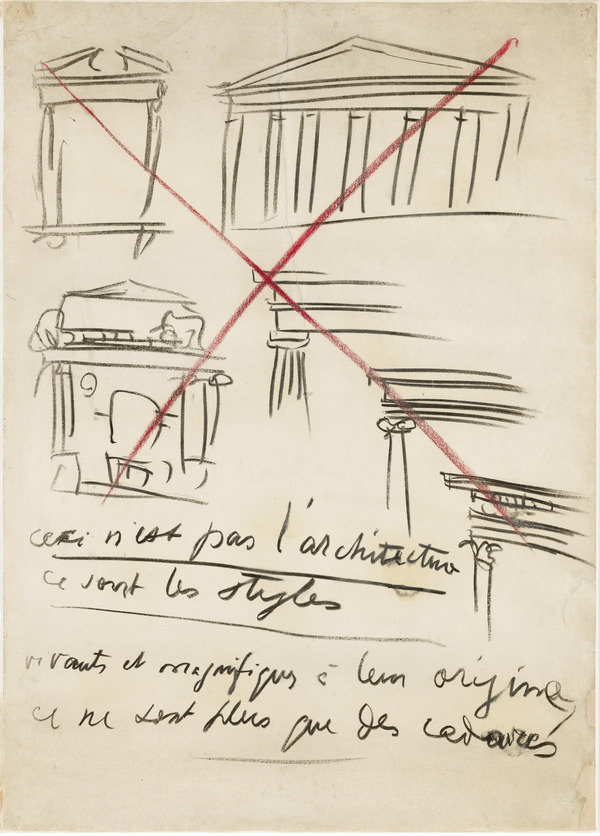Building Collections
dal 9/11/2010 al 29/5/2011
Segnalato da
Louis Sullivan
Le Corbusier
Bodo
Heinz Rasch
Jean Tschumi
Ant Farm
Paulo Mendes da Rocha
Jean Tschumi
UN Studio
Sauerbruch Hutton
Seung H-Sang
Barry Bergdoll
Margot Weller
9/11/2010
Building Collections
The Museum of Modern Art - MoMA, New York
The exhibition, which is organized around several thematic areas, covers the full range of MoMA's collection from the 1890s to the present, and features such figures as Louis Sullivan, Le Corbusier, Bodo and Heinz Rasch, Jean Tschumi, Ant Farm, Paulo Mendes da Rocha, Jean Tschumi, UN Studio, Sauerbruch Hutton, and Seung H-Sang. The vast majority of models and drawings are being exhibited for the first time.

Building Collections: Recent Acquisitions of Architecture,
on view November 10, 2010 through May 30, 2011, highlights the great variety of important
acquisitions made by the Department of Architecture and Design since 2005, juxtaposing, in
several cases, newly acquired material with works long held in the collection in order to
underscore the rationale and motives behind collecting architecture at MoMA. The exhibition,
which is organized around several thematic areas, covers the full range of MoMA’s collection from
the 1890s to the present, and features such figures as Louis Sullivan, Le Corbusier, Bodo and
Heinz Rasch, Jean Tschumi, Ant Farm, Paulo Mendes da Rocha, Jean Tschumi, UN Studio,
Sauerbruch Hutton, and Seung H-Sang. The vast majority of models and drawings are being
exhibited for the first time. Building Collections is organized by Barry Bergdoll, The Philip Johnson
Chief Curator of Architecture and Design, and Margot Weller, Curatorial Assistant, Department of
Architecture and Design, The Museum of Modern Art.
Building Collections is organized around eight themes, beginning with “Ornament and
Crime,” which reconsiders the 1920s dismissal of ornament as an aspect of modernism, revealing
the important role ornament actually played in the emergence of abstraction. Works from this
section date from 1890 to 1930 and include Louis Sullivan and Dankmar Adler’s Art Nouveau
Chicago Stock Exchange Frieze (1893); Charles Rennie Mackintosh and Margaret Macdonald’s
1901 mantel piece drawing for 3 Lillybank Terrace, which harmoniously merges architectural and
decorative features; and a Hans Poelzig Concert Hall project drawing (1918) that shows the
capacity for ornament and color to affect mood and make architecture a vehicle for emotion. “X”
examines the graphic technique of using an X to reject past architectural ideology in favor of new
modernist thinking. Examples include a drawing from Le Corbusier’s, “Ceci n’est pas l’architecture”
Buenos Aires Lecture (1929), in which he drew large Xs over classic architectural styles and
declared, “This not architecture, its only styles, alive and magnificent in their own time, today
they are nothing more than cadavers,”; and Willi Baumeister’s poster, Wie Wohnen? Die Wohnung
Werkbund Austellung (1927), created for an exhibition of housing, in which he crossed out an
image of a traditional elaborately decorated interior with a red X.
“Urbanism” explores the recasting of the modern city through such works as
sketches from Heinz and Bodo Rasch’s Suspension Houses Project (1927–28), which appropriated
technology from suspension bridges into an innovative suspended skyscraper type; and Jean
Tschumi and Henry Vermeil’s drawings for Stockholm Master Plan (1932), one of the earliest
applications of Le Corbusier’s radical ideas to modernist city planning. “Utopias and Alternative
Modernisms” includes unrealized projects from the 1970s, including Haus Rucker Co.’s Stück
Natur (Fragment of Nature) (1973) as well as realized ones like Ant Farm’s House of the Century
project plans and elevations (1971–73).
“Young New York Architecture” documents how New York City inspired key figures to
invent new architectural expressions and theories of urban architecture. Examples include Frank
Lupo and Daniel Rowen’s photo collage Tower Stripped Bare by Time Even (1984), made for a
competition that was an attempt to revitalize Times Square; Renzo Piano’s model for the New
York Times Building (2007); and 2003 models from David Childs and Guy Nordenson for World
Trade Center 1. “Young Berlin Architecture” highlights the reconstruction and new architectural
prominence of German architecture after the fall of the Berlin Wall in 1989. Sauerbruch Hutton’s
GSW Headquarters (1991–99), Barkow Leibinger’s GATEHouse (2008), and Jüergen Mayer H.’s
Mensa Karlsruhe Dining Hall (2005–06) are featured projects.
“Process” displays a collection of objects, such as models, sketches, and plans, that
illustrate design development and show the procedures involved in building a structure.
Architectural projects in this section include UNStudio’s Mercedez Benz Museum in Stuttgart
(2001–06), Steven Holl’s Linked Hybrid in Beijing (2003–06), and Thom Mayne and Morphosis’s
Phare Tower in Paris (2006–2010).
The final theme, “Latin American Modernism,” addresses MoMA’s early interest in the
subject and its current commitment to acquire works for the collection. Highlights include multiple
projects by
Paolo Mendes da Rocha, and several drawings made by Oscar Niemeyer during his time in France,
including Urban Plans (ZAC) Projects for Grasse, Dieppe and Villejuif (1967–78).
Image: Le Corbusier (Charles-Édouard Jeanneret) (French, born Switzerland. 1887-1965) "Ceci n'est pas l'architecture" Drawing from Buenos Aires Lecture. 1929. Charcoal and crayon on paper, 39 3/4 x 25 9/16" (101 x 65 cm). The Museum of Modern Art, New York. Gift of Agnes Gund in honor of Patricia Phelps de Cisneros.
Press Contacts:
Kim Donica, 212/718-9752, kim_donica@moma.org
Margaret Doyle, 212/408-6400, margaret_doyle@moma.org
The Museum of Modern Art MoMA
The Philip Johnson Architecture and Design Galleries, third floor
11 West 53 Street, New York, NY 10019, (212) 708-9400
Hours: Wednesday through Monday: 10:30 a.m.-5:30 p.m. Friday: 10:30 a.m.-8:00 p.m.
Closed Tuesday
Museum Admission: $20 adults; $16 seniors, 65 years and over with I.D.; $12 full-time students with
current I.D. Free, members and children 16 and under. (Includes admittance to
Museum galleries and film programs). Target Free Friday Nights 4:00-8:00 p.m.



